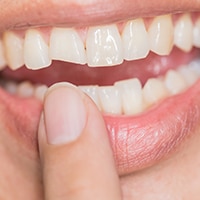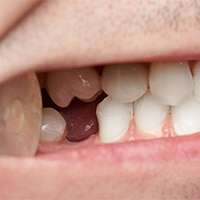Emergency Dentist IN Addison, TX
Don't Suffer In Pain - Get Help Now

Call Us Right Now If You’re Experiencing:
- Intense or sudden tooth pain
- Severe swelling or hypersensitivity in your mouth or gums
- A fractured, broken, or lost tooth or crown
- Severe pain or loss of movement in your jaw
How We Can Help You
- Same-Day Emergency Appointments Available
- Sedation Options Ready To Ease Your Pain
- Dental Insurance Accepted & Flexible Financing
Symptoms You Should Never Ignore
- Tooth pain that is severe, persistent, or shows up suddenly
- Chips, cracks or fractures in your teeth
- A knocked out tooth
- A missing crown or filling
- An abscess or any painful swelling
- Bleeding from your gums that is excessive or persistent
If you notice any of these signs, contact us immediately.
Even if you’re unsure about whether your situation really “counts” as an emergency, rather call to make sure. We’ve seen it all and we can help you by:
- Telling you if you need to come in urgently for an emergency appointment
- Giving you advice on how to manage or relieve your symptoms
How To Manage Common Dental Emergencies


Severe Toothache
Food pieces can easily get caught between your teeth and gums, causing pain and discomfort. Rule out this possibility by flossing and rinsing your mouth out with water.
If the pain continues or gets worse, call us right away to schedule an appointment. It’s likely that some decay is present and needs to be treated immediately, or you might risk losing your tooth.
While you wait for your appointment, over-the-counter painkillers like ibuprofen can help manage your pain.
Note: avoid taking aspirin as it can actually cause more discomfort if it comes into direct contact with your tooth.
Chipped Or Broken Tooth
Start by confirming if any pieces of the tooth have come loose. If so, collect them and bring them with you to your emergency appointment. We might be able to reattach them.
If your face starts swelling, use a cold compress to help reduce the swelling and ease your pain.
We will likely fix your damaged tooth with a dental crown, but if the damage is too severe, we may need to extract the tooth outright.
Whatever the outcome might be, Dr. De Vincenzo and Dr. Saremi are both experienced in emergency treatment and will be able to do what’s best for your health and smile.


Knocked-Out Tooth
Make sure to stay calm and look for the tooth. Once you find it, pick it up gently by the crown, being careful not to touch the root (the part that usually sits under your gumline).
Rinse it gently with milk, lukewarm water, or salt water. Do not remove any connective tissue from the tooth in the process and, again,avoid touching the root.
Gently place the tooth back into your open socket. If this cannot be done safely or without causing pain, try holding the tooth in your cheek pocket or keep it in a container of milk.
There is only a small window of time for a successful reattachment, so don’t wait. Call us immediately.
Lost Filling/Crown
Losing a dental restoration can cause sensitivity or discomfort. This is because your damaged tooth is now exposed to bacteria and the elements.
Leaving your tooth exposed can lead to infections and might even require a tooth extraction. Call us right away to book an emergency appointment.


How to Prevent Future Dental Emergencies
If you’re looking for ways to reduce you and your family’s risk for developing a dental emergency, consider the following tips below:
- Always schedule two dental checkups and cleanings every year. These visits are meant to give dentists an opportunity to discover damage early on and prevent it from becoming an emergency down the road.
- Avoid chewy, sticky, or excessively hard foods, and especially avoid chewing on ice.
- Always use the appropriate tool for certain tasks, such as scissors for tearing into difficult packaging. Do not use your teeth.
- Wear a mouthguard if you plan on participating in a sporting event or other physical activity where contact is likely.
The Cost of Treating Dental Emergencies
Since no two emergencies are the same, some patients may only need prescription drugs to treat their emergency, while others may need a more complex reconstructive treatment, such as a dental crown or dental implants. During your emergency appointment, we’ll go over any relevant findings and provide treatment recommendations based on these findings. We’ll provide full transparency when outlining prices before beginning any actual treatment. We’re also happy to file insurance claims on your behalf for convenience.

Frequently Asked Questions
Do you still have questions about what to do in case a dental emergency occurs? When you contact Addison Family Dentistry, our team will walk you through any first-aid advice and make sure that all of your questions are answered. We’ve also answered some common questions that might help you.
Facial swelling can occur for a variety of reasons, including a tooth infection or dental trauma. You can place a cold compress on the area for 10 minutes on and 10 minutes off for up to an hour to help bring down any puffiness. This will also help ease any lingering pain that your oral health problem may be causing. If your swelling is being caused by an infection, don’t use any type of heat on the area, because it could cause the issue to rapidly spread, making it worse than it already is.
During a dental emergency, it can be hard to problem-solve and hash out what’s the best action to take for your health. Even though our office is highly advanced and our team is experienced, certain emergencies we simply can’t treat and require a visit to your local emergency room. These include:
- A broken or fractured jawbone
- A deep facial laceration that requires stitches
- Any problem that’s making it difficult to breath or swallow
In these scenarios, you’ll need to receive medical attention before we can address any dental damage and treat lingering oral health problems. After you visit the ER, be sure to contact our office so we can provide you with the additional dental services you need.
As much as everyone would like to wish that their oral health problems would just disappear on their own, that’s often not the case. Dental emergencies like toothaches only get worse the longer you put them off. Plus, with our fantastic $29 emergency visit special, it seems like a no-brainer to get the issue addressed before it causes you even more trouble down the road.
If you’re experiencing oral pain or discomfort, chances are, your body is letting you know that something serious is wrong and you need urgent care. For fast pain relief and peace-of-mind, don’t hesitate to contact our office. We’ll ask you about your symptoms and let you know whether your problem needs to be taken care of right away, or whether it can wait.


